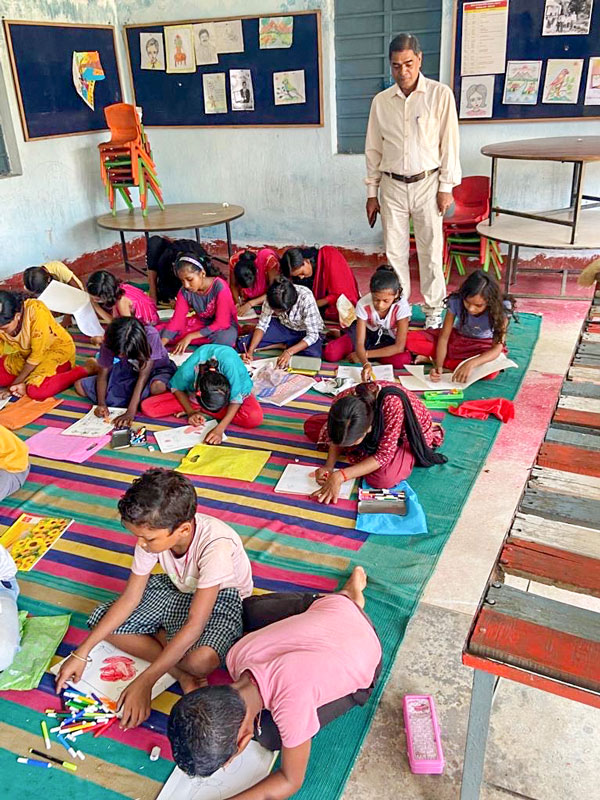At a village called Algora, about 30 km away from the steel city Bokaro, in Jharkhand State, Rotary is a household name, all thanks to RC Bokaro Steel City, RID 3250. Club members are regular visitors here right from 2017, when the club decided to adopt this village with some 2,500 people. Many Sundays dawn in the village with Rotarians from this club bringing small treats for the children!

Thanks to the dedication efforts, hard work, focus and a clutch of welfare activities, Algora today has a well-equipped play school with smiling faces, five classrooms and another room where the club runs a homeopathy clinic. Apart from the elementary health care services provided by this clinic, where the club has employed a doctor for treating simple ailments such as fever, stomach pain, and other aches and disorders, regular medical camps are also organised to screen the villagers for other ailments and serious medica problem are referred to the Bokaro city. The homeo clinic itself provides medical service to some 500-600 patients every month

When asked why the club, which has 78 members, decided to adopt this particular village, club secretary Ghanshyam Dass said that in 2017, when the club’s leadership decided to do some welfare projects in a village, one of the members, who knew the sarpanch of Algora, suggested the club adopt this village as the members could plan the community welfare activities in consultation with the panchayat leaders and members.
“First of all, we wanted to build a school, and the panchayat members gave us the go ahead and also a plot of land, where we built six rooms. Five of these rooms we use for the play school where we have employed seven teachers with B Ed degrees, whose salaries we pay. Earlier about 150 children used to attend classes here where basic education and elementary behaviour such as good manners, the way to speak politely, etc, are taught. But after Covid, only 130 children have returned,” he says.
First of all, we wanted to build a school, and the panchayat members gave us the go ahead and also a plot of land, where we built six rooms.
— Ghanshyam Dass, club secretary
In this play school, which the Rotarians have named Asha ki Kiran, alphabets in English and Hindi, numbers and basic arithmetic such as counting, are taught, adds club president Nirupama Singh. The children are gifted uniforms, stationery, books, water bottles, shoes and socks.
Dass adds that the school also runs a three-month course in drawing and art for batches of 30-35 students. “A retired and renowned art teacher Mohan Azad gives us free service and trains the students. Our students participate in inter-city and inter-state level competitions, and every year they win prizes and make our club proud.”

On special occasions such as birthdays, marriage anniversaries, festivals, etc, club members donate money and on Sundays, this money is used to give a treat to the children, with the Rotarians bringing for them snacks, juices, stationery etc.
The play school premises are also used to run adult literacy classes in the evenings for batches of 15 adults, “where we give them basic education so that they can sign their names, open their account in a bank and operate it themselves,” adds Nirupama.
The play school premises are used to run adult literacy classes where basic education is given so that villagers can sign their names, open their account in a bank and operate it themselves.
The club organises regular health care and screening camps for the 2,500-odd villagers. These camps are planned and executed by club member Dr S C Munshi, who is a paediatrician. About 10 specialists known to him from different specialties such as cardiology, ophthalmology, dentistry, gynaecology, dermatology etc check the villagers and give medicines for about one month to those with problems. Those with serious ailments or requiring surgery are referred to bigger centres.
While some villagers have left for towns in search of employment, most villagers, with small landholding of one or two acres are engaged in farming, and grow cereals as well as sugarcane. Asked about the Rotarians helping them with water resources for agriculture, Dass said the village has a pond which has enough water. “And the government has put hand pumps in several areas, so the villagers don’t face a water problem for their daily needs. In our school, of course, we have given a piped water connection and also built separate toilets for boys and girls.”

For the success of this project and the development of the village through “activities that are running continuously and smoothly since 2017 when we adopted this village, I would give credit to the four pillars of the Algora project — past presidents of our club Ashok Taneja, Jaywant Sheth, Ashok Jain and PA Zachariah,” says Dass. In the last six years the club has raised and spent about ₹10 lakh on the transformation of this village. Union Bank also occasionally helps fund welfare activities in this village through its CSR funds.
On future plans, he says the club members want to extend their footprint in Algora. “Now what we have is only a play school; slowly we want to add Classes 1 and 2. Right now the children go to a school in a nearby village. Recently, when our DG Sanjeev Kumar Thakur visited this village, we distributed uniforms and planted fruit trees such as guava and mango. Greening the region with regular tree planting is another regular activity we have.”





